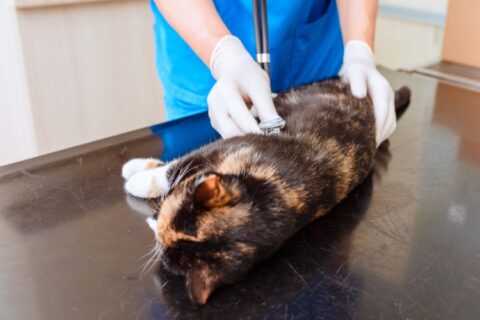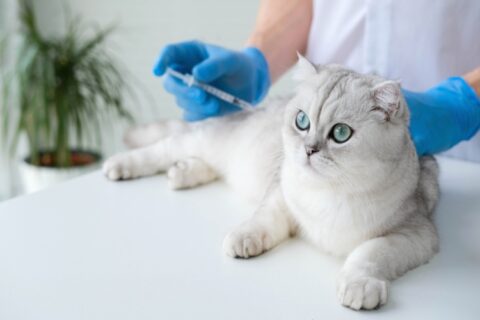Herpesvirus Infections in Cats (Feline Viral Rhinotracheitis)
What is Herpesvirus Infection in Cats?
Feline Viral Rhinotracheitis, or FVR is an infection of the upper respiratory tract of cats. It is caused by the Feline Herpes Virus and is a very common cause of URIs along with the feline calicivirus or FCV. Feline Herpes Virus can be very painful and irritating to cats and if it is left untreated, or if the cat is already in poor health, it can cause secondary infection and can even become deadly. 
FHV causes acute upper respiratory infections in cats. It is highly contagious.
How does a Cat become Infected with Feline Herpesvirus?
A cat can become infected with FHV-1 by direct contact with virus particles. It is a virus that is spread through droplets and when a cat comes in direct contact with the saliva of another cat who has feline herpesvirus. When a cat is infected with FHV, they are more likely to have discharge of the eyes and nose. A cat can also become infected by coming into contact with objects that have become infected with viral particles, such as blankets, food and water dishes, beds, clothing, furniture, etc.
How Long is a Cat Infectious After Getting the Virus?
The incubation period of FHV-1 is 2-5 days. Then once a cat is infected with FHV-1, it will become symptomatic. The cat is contagious to other cats during this incubation period and they are also contagious once they have become symptomatic. The cat continues to be contagious about 10-20 days after becoming symptomatic.
How long can the virus live in the environment?
The virus can survive on inanimate objects, but thankfully the secretions usually dry up and when it dries up the virus will die. Viral particles on the skin remain a threat for up to 30 minutes. Food and water bowls, litter boxes, cat toys and other objects will usually remain contagious up to 18 hours. Soft surfaces are more of a threat usually because it takes secretions a longer time to dry on these surfaces. Usually though, and under normal conditions, the secretions will dry up in a few hours and the virus will die.
How can the virus be killed?
The virus can be killed outside the body or host with antiviral cleansers or bleach. Contaminated items should be soaked in or sprayed with bleach. The bleach should sit or soak for at least 5 minutes.
Killing the virus inside the body is more complicated, but there are many treatments when it comes to treating the cat who has the virus.
Which cats are most at risk for FVR infection?
Kittens and other cats who are not vaccinated are at the highest risk for infection. Cats with compromised immune systems are also in the high-risk category.
What are the clinical signs of FVR infection?
Some of the most common signs of FVR involve the entire upper respiratory tract. That means the eyes, nose, and throat. Upper respiratory symptoms can include
- Sneezing
- Nasal congestion
- Redness of the eye
- Excessive blinking or squinting
- Discharge from the eyes or nose
- Inflammation of the cornea
Other symptoms can include
- Inflammation or infection of the cornea
- Fever
- Lethargy
- Anorexia
- Enlarged lymph nodes
- Ulcers around the mouth, tongue or nose
How is FVR diagnosed?
Most commonly, a PCR test is performed. This test will evaluate for several viruses and bacteria that can cause the symptoms of a URI. Swab samples are collected from the eyes and throat and sent to a diagnostic lab. Results are usually available within one week.
Treatments
Typically, when a cat has the herpes virus, there are secondary bacterial infections at work as well. This will require antibiotics. However, there are also several antiviral treatments that work well for feline herpes virus.
- Systemic Antiviral Therapy
Famciclovir is an antiviral that works well in the treatment of the herpes virus in humans. It also works well for cats
- Topical Antiviral Therapy
Eye drops that are antivirals used for humans can also be used for cats and can also reduce the duration of the conjunctivitis and keratitis that are experienced when a cat has the herpes virus.
Are other Cats in the Household at Risk of Infection?
Yes. The Feline Herpes Virus is highly contagious to other cats. If one cat in your house has been diagnosed, it is wise to keep the cats separate and clean used items with bleach.
Is My Family at Risk?
The upper respiratory infection that is caused by feline viral rhinotracheitis is only contagious when it comes to spreading it to other cats. It cannot be passed to humans. However, there are some secondary infections that can be spread to humans. If you make sure to keep proper hygiene and wash your hands regularly, you should be fine.
How Can This Disease Be Prevented?
Vaccines-There are vaccinations available for FHV and it is important for all cats to receive a vaccine to keep them protected from this virus. Kittens will receive the vaccine around 8 weeks of age and will get boosters every 1-3 years.
What is the Prognosis for a Cat Diagnosed with FVR?
Although no cure exists for Feline Viral Rhinotracheitis, there are many treatments available to keep it at bay. Many cats are able to be medically managed and lead normal lives. Feeding a cat a healthy diet and reducing stress are two great ways to help your cat stay healthy and free of the virus.
Reed Animal Hospital
If you’re in the San Jose area and seeking veterinary care, you can turn to Reed Animal Hospital. From flea and tick prevention to routine vaccinations to treatment of more serious illnesses, we want to help you care for your pet. We offer a comprehensive list of services, including referrals to specialty surgeons for more complex issues. For more information, visit our website or reach us by phone at (408) 369-1788 in the Campbell area or (408) 647-2906 in the Saratoga area. Or you can email us at reedanimalhospital@gmail.com. We know you love your pets and we want to help you and your pet enjoy a happy and healthy life together. At Reed Animal Hospital, “we treat your pet as if they were our own.”


